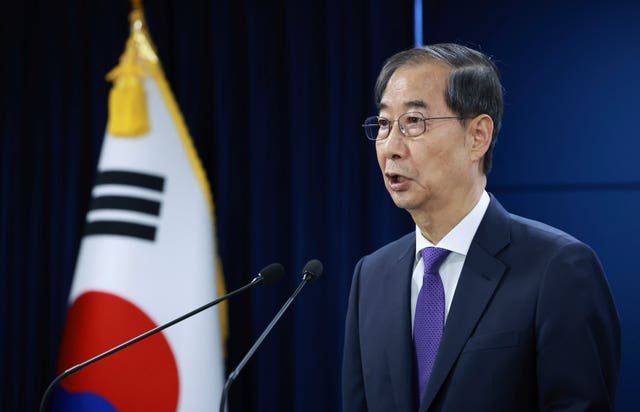South Korea’s ex-PM Han says he will seek presidency in June election
Mr Han said: ‘I’ve determined to find what I can do for the future of the Republic of Korea that I love and for all of us.’

South Korea’s former prime minister Han Duck-soo said on Friday he will run in next month’s presidential election and would seek to lessen the powers of the office and ease strife-ridden domestic politics if he wins.
Mr Han’s entry heats up the scramble among conservatives to unify behind a candidate to compete with liberal front-runner Lee Jae-myung, whose campaign was set back by a court decision to open a new trial on election law violation charges.
“I’ve determined to find what I can do for the future of the Republic of Korea that I love and for all of us,” Mr Han told a press conference at the National Assembly.
South Korea is holding an early presidential election on June 3 after conservative president Yoon Suk Yeol was ousted over his imposition of martial law.
Mr Han had been appointed prime minister, the number two post, by Mr Yoon and he served as acting leader after the former president was suspended and later removed from office.

Mr Han was also prime minister under liberal president Roh Moo-hyun from 2007 to 2008 and has served as trade minister, finance minister and ambassador to the US during his 40-year career.
He has never held elected office but has risen politically as the main conservative People Power Party (PPP) struggles in the wake of Yoon’s ouster.
Mr Han does not belong to a political party, but contenders in the PPP have said they are willing to field a single candidate among them and Mr Han.
PPP members are scheduled to nominate their party’s candidate on Saturday.
Mr Han said that if elected, he would launch a body to amend the constitution so the president and the assembly share powers based on the principle of checks and balances.
His revisions would also bar the political circle and the judiciary branch from meddling in each other’s sectors.
In South Korea, executive power is heavily concentrated on a president and there have been calls for change.
The election on June 3 will give the new president a full, single five-year term.
But Mr Han said he would serve three years to finish the constitutional revision and then leave.
Mr Han said he would also use his expertise on economic affairs to resolve trade issues with the US over president Donald Trump’s tariff policies.





